You think Ancient Chinese is obscure and hard to understand? Here, legendary masters from ancient Chinadeliver the lectures.You think teachers only are available during class for Q&A? Now, AI teaching assistants trained by faculty are ready to help anytime.
In the age of artificial intelligence, how can traditional classes and AI technology coexist and thrive? Today, let’s step into Peihua’s classrooms to find the answer.
“Han Feizi” is teaching class in person? His very first words set the intellectual bar sky-high.
Ancient Chineseis a core course in Chinese Language and Literature, but its vast scope and archaic language have long made it no torious among students as “the ultimate challenge in Chinese studies”. Yet, in Jia Kunnuo’s classroom, a completely different scene unfolds—students rush to grab front-row seats and eagerly compete to answer questions. What makes this class so captivating? Our reporter Xiao wei visited the class, only to find herself plunged straight into a masterclass-level intellectual showdown.
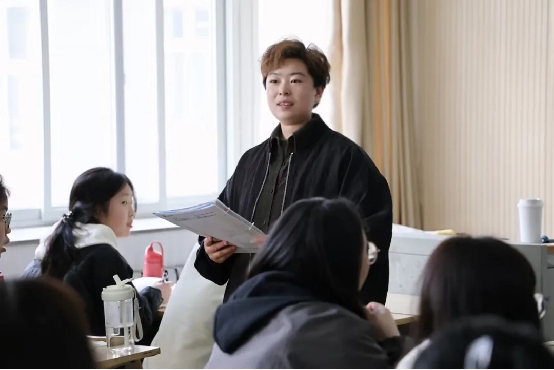
The class began with Teacher Jia announcing in her delightfully humorous Northeastern accent, “Today, we’re studying Han Feizi’s The Five Vermin. Since it’s his work, why not let him explain it himself?” The room erupted in laughter—until she clicked to the next slide, and a portrait of Han Feizi actually started lecturing on the text. The students’ eyes instantly lit up. “Do you know what the ‘Five Vermin’ are?” asked Han Feizi, generated by AI, as he stood with a sweep of his sleeve, speaking in refined Classical Chinese tinged with the accent of the Warring States period.
The AI-generated Han Feizi meticulously replicated his signature austere and incisive rhetorical style, recounting the creative process behind his works. With vivid depictions of the Warring States period’s social milieu, he elucidated for students the tripartite political philosophy of Law, Statecraft and Authority.
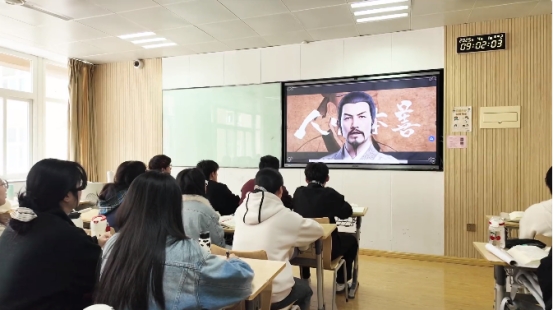
Jia’s AI-created digital avatar of Han Feizi may appear like a time-traveling teaching experiment, but it embodies profound educational innovation. Introducing this AI-powered “Digital Han Feizi” into the classroom discussion ofThe Five Verminrepresents a paradigm case of AI-enhanced traditional humanities education.Through this technology-driven reform, teacher Jia has transcended the conventional limitations of classical Chinese instruction, transforming the Ancient Chinese course into a gateway for students to gain wisdom and broaden their intellectual horizons.
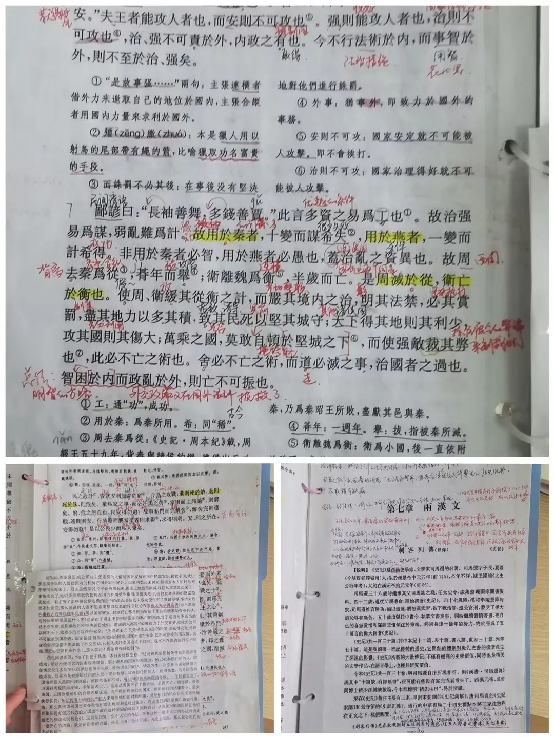
Jia Kunnuo’s Teaching Notes
Jia remarked:“Using AI to deliver course content not only bridges the gap between students and classical texts through technology but also reveals their contemporary relevance. When students applaud the digital Han Feizi’s eloquent arguments, what they truly grasp is not just the ideas of a Warring States philosopher—but the timeless appeal of a dialogue between ancient and modern wisdom.This technologically mediated humanistic experience is itself a form of classroom expression I aim to teach.”
Beyond digital avatars, Jia also employs AI to generate comics, challenging students to guess Han Feizi-related idioms—deepening their understanding and retention. The classroom transforms into a playground, buzzing with shouts of eager responses, making learning unexpectedly exhilarating!
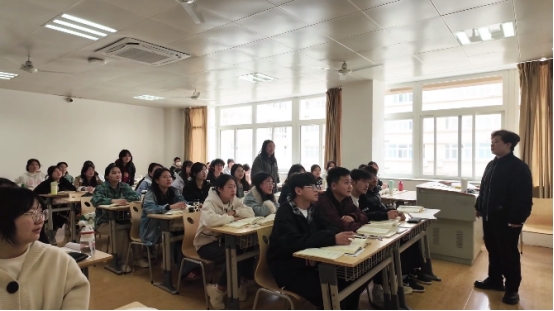
Integrating AI games into the classroom represents not just an innovation in teaching methods, but a paradigm shift for passing down traditional culture in the digital age. After class, students couldn’t stop raving about the class:
“My brain was fully locked into the class for all 100 minutes!”
“Who knew AI could be this much fun?”
“So intense and exciting—I didn’t even think about checking my phone!”
“Now THIS is how you make Ancient Chinese come alive!”
AI Teaching Assistant & Super Study Companion—Unlocked Instantly in This Classroom!
Dan Juanhao, an engineering cost major, was in the laboratory at 9:30 pm consulting with his AI Teaching Assistant: “The total station’s measured angular closure error exceeds the limit, but my procedure checks out. Where could the problem be?”
The AI Assistant immediately pulled up course materials and case studies fromEngineering Surveying. Cross-referencing Dan’s operation records, it analyzed: “Recommend verifying the prism constant settings at your survey station.”
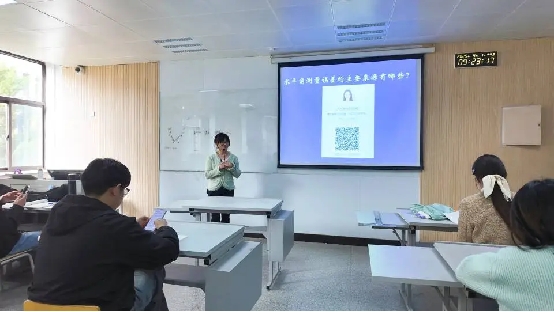
The AI teaching assistant used by Dan Juanhao, called “Teacher Xiao Jie’s Assistant” was created by Liu Jie, the instructor of the Engineering Surveying course. Liu has uploaded nearly a thousand pieces of content to the ZhiPu QingYan AI teaching assistant platform, including course materials, practical cases, and information on students’ skill levels.This enables the AI assistant to provide three-dimensional support of “solutions + knowledge graphs + classic cases” for specific problems, thereby delivering high-quality Q&A support to students.

Liu Jie has produced nearly 100 micro-lecture videos to provide the AI teaching assistant with more precise materials for answering students’ questions.
Why use AI teaching assistants? Liu Jie explains, “Engineering Surveying is a practice-oriented course requiring extensive student experimentation. Since instructors can’t provide 24/7 guidance, our teaching team has pioneered deep integration of AI with engineering education.By establishing a tripartite intelligent teaching model of ‘AI Teaching-Assisting-Managing,’ we’ve achieved a transformative leap from traditional instruction to smart education, injecting technological momentum for cultivating interdisciplinary talents in the new era.”
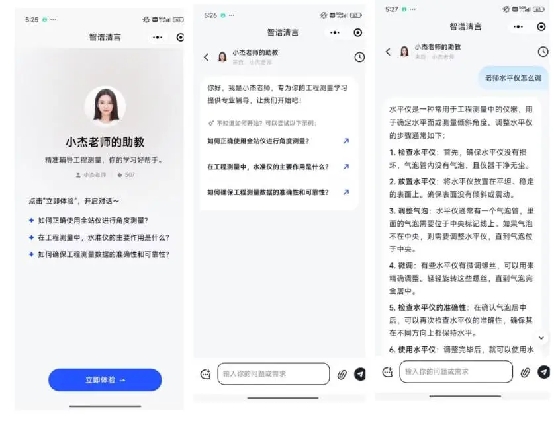
The AI Teaching Assistant serves as an “intelligent brain” for instructors’ lesson preparation. When teachers use the AI system for course design, it provides comprehensive analytics to identify students’ knowledge gaps. Moreover, the system automatically generates optimized teaching materials (including lesson plans and PowerPoint presentations) while recommending relevant case studies, academic literature, and video resources - significantly enhancing instructional preparation efficiency.
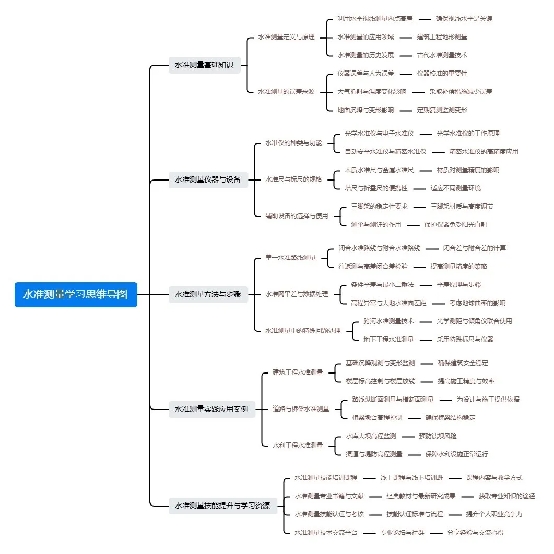
The mind mapgenerated by students withthe help of“Teacher Xiao Jie’s Assistant”
Wang Hanjia, an Engineering Cost major, commented: “The AI Teaching Assistant system also serves as a ‘data sentinel’ for monitoring our learning progress. Based on our knowledge mastery levels, it recommends personalized review materials and practice exercises to help consolidate understanding and address knowledge gaps.”
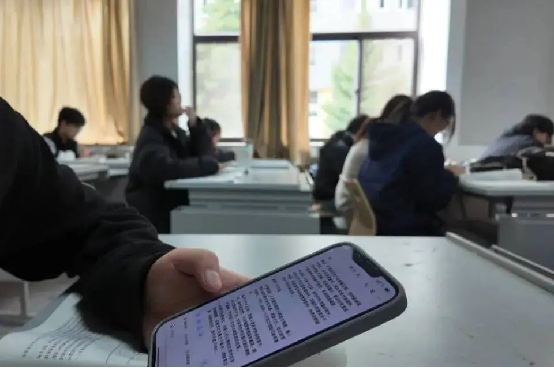
In the classroom, students actively engage with the AI Teaching Assistant to answer questions.
“We want AI to become a bridge connecting classical measurement theory with future technologies,” Liu Jie emphasized. “This educational transformation aims not merely to teach instrument operation, but to cultivate students’ capability to redefine surveying boundaries through algorithms.”
Over the past two years, the university has carried out related work in the field of AI-empowered education, including standard formulation, plan issuance, and course establishment. In April 2024, the university issued the Xi’an Peihua University Faculty Artificial Intelligence Literacy Standards; in May, it issued theXi’an Peihua University Faculty Artificial Intelligence Literacy Enhancement Action Plan; in June, it initiated the construction of 50 AI-empowered teaching reform pilot courses. These have all become important measures for the university to empower the improvement of faculty AI literacy and implement digital education reform.At Peihua, teachers are continuously transforming into“AI Orchestrators”,while students are evolving into“Intelligent Navigators”. This educational practice that began with technological empowerment will ultimately arrive at the return to the essence of education:the true meaning of educational digitalization lies not in chasing technological waves, but in using technology to safeguard the most fundamental educational ideal—allowing every soul to bloom with unique brilliance in the intelligent era.






